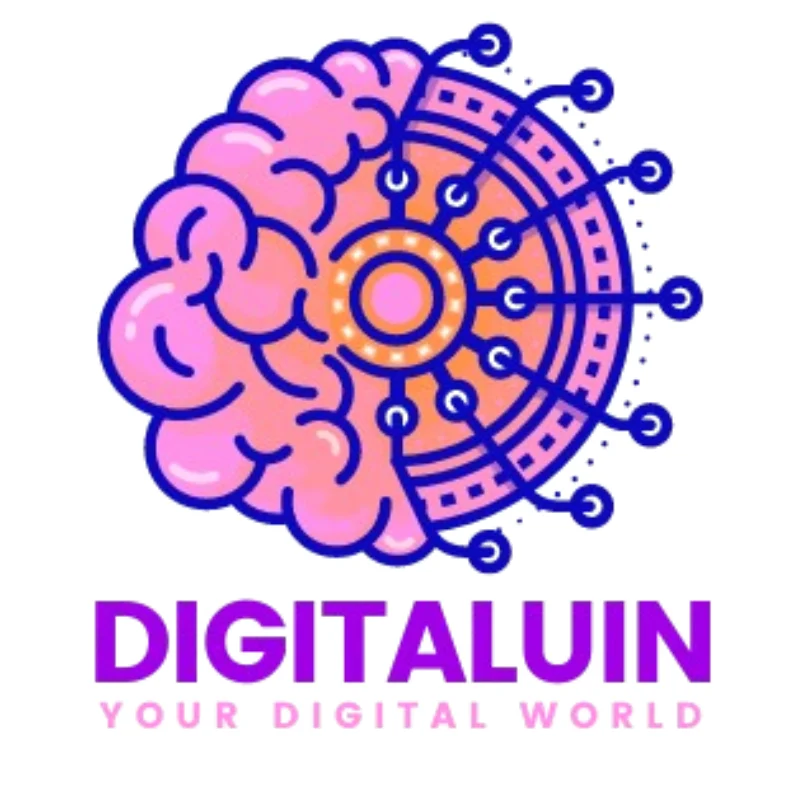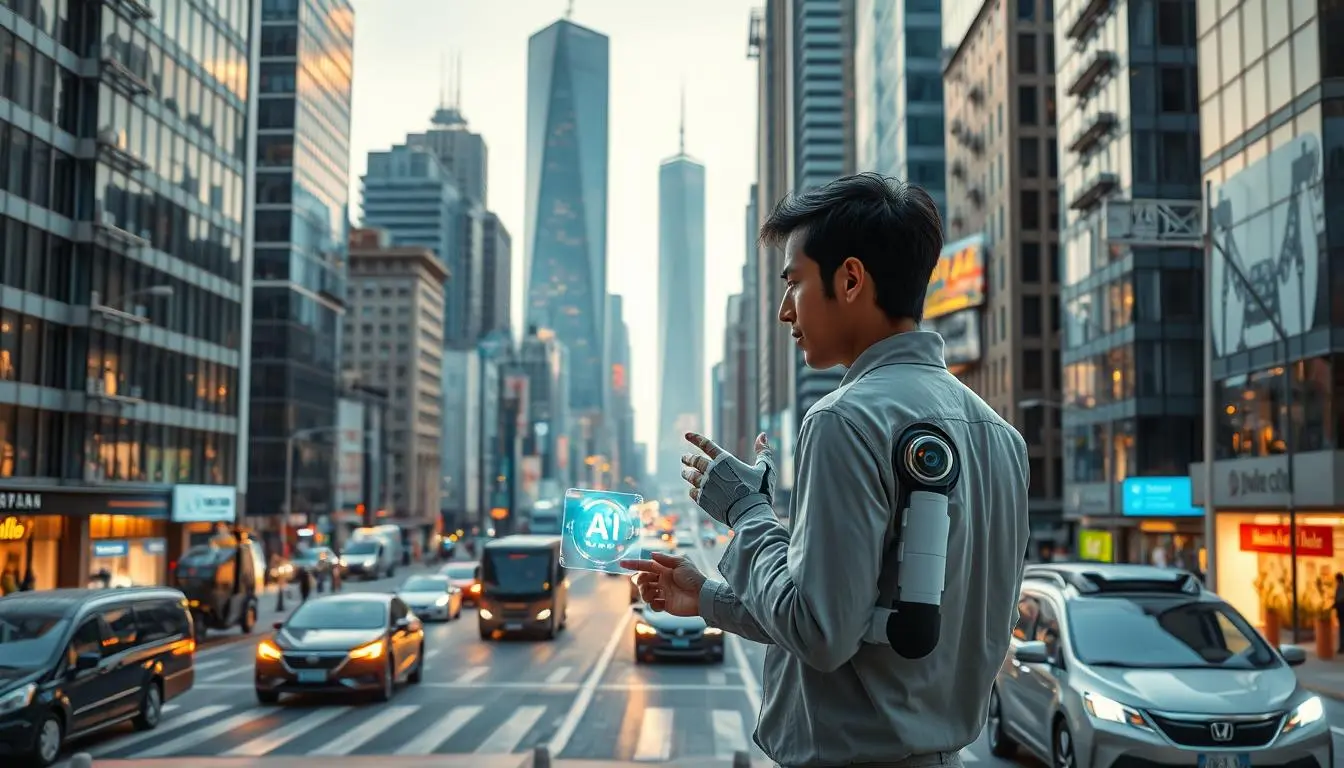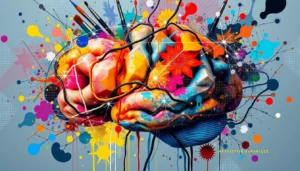How AI is Changing Everyday Life: 10 Real-World Examples
You use artificial intelligence every day, often without knowing it. It’s in unlocking your phone with Face ID and getting movie suggestions on Netflix. AI is now deeply embedded in our daily experiences, influencing the way we interact with technology, often without us even realizing it.
Much of AI’s impact goes unnoticed as it operates silently in the background during your daily activities. It makes your digital assistants talk back, sorts your emails, and helps with your commute. From voice-activated gadgets to banking platforms and online networks, AI is working behind the scenes.
This article will look at 10 examples of how AI changes your daily life. It simplifies tasks and boosts productivity in ways we often take for granted.
Table of Contents

The Dawn of AI: From Science Fiction to Daily Reality
AI’s journey from science fiction to everyday life is truly amazing. AI quietly powers many aspects of our daily habits, working behind the scenes to simplify tasks and enhance both personal and professional life.
The Rapid Evolution of Artificial Intelligence
Artificial intelligence has changed a lot in just a few decades. It started as a dream in science fiction, and now it’s a real technological wonder. This change is thanks to big steps in machine learning, natural language processing, and data analysis.
- Through evolving algorithms, machine learning allows systems to grow more accurate by learning from real-world data.
- Natural language processing has made AI better at talking and understanding humans.
- Big datasets have helped AI grow in many fields.
How AI Has Quietly Integrated into Your Daily Routine
Whether you realize it or not, AI influences your day from the moment your alarm rings to when you power down at night. For example, AI-powered virtual assistants like Siri and Google Assistant help you plan your day, play music, and control your smart home.
AI also helps with navigation, like Google Maps, giving you traffic updates and the best routes. Your smartphone uses AI too, for things like facial recognition and personalized suggestions.
As AI keeps getting better, its role in our lives will grow even more. By understanding AI and its possibilities, we can explore new ways to use it. This digital revolution holds the power to dramatically elevate the way we experience daily life.
Smart Home Assistants: Your AI-Powered Household Managers
Smart home assistants have redefined how we interact with our living spaces. These tools offer unprecedented levels of ease and control in how we manage our environments. These AI helpers are not just cool gadgets; they’re changing how we live at home.
Transforming Home Management with Voice Commands
Devices like Alexa, Google Assistant, and Siri let you control your home with voice. With a simple voice request, you can adjust your home’s lighting, temperature, or security, making your space smarter and more responsive.
For example, you can tell your assistant to turn on lights, play music, or set reminders. This hands-free control is great when you’re busy cooking, cleaning, or doing other things.
Learning and Adapting to Your Preferences
These smart assistants use machine learning advancements to get to know you. They learn your habits and adjust to make your home more personal and responsive.
They might figure out your daily routine and adjust the thermostat or coffee maker for you. Your home becomes more adaptive and user-friendly thanks to these innovations.
As smart home tech gets better, these AI assistants will do even more. They’ll make your home even more integrated into your daily life, changing what it means to have a smart home.
AI in Healthcare: Revolutionizing Diagnosis and Treatment
AI is revolutionizing the medical field by delivering sharper diagnoses and individualized care strategies. These changes are thanks to AI and smart technology, which are making healthcare better.
Its role in healthcare extends beyond mere innovation; it’s reshaping how care is delivered. It’s about making patients healthier and making doctors’ work easier. AI-powered diagnostic tools are leading this change. They help doctors find diseases early and accurately.
Diagnostic Tools Saving Lives
AI tools can look at lots of medical data, like images and patient histories. They find patterns that doctors might miss. For example, AI can spot problems in X-rays and scans very well.
These tools get better over time thanks to machine learning. This means you’ll get more accurate diagnoses and treatments that fit your needs.

Personalized Medicine Through Machine Learning
By analyzing genetic markers, health records, and habits, machine learning tailors medical care to the individual. By analyzing genetic data, medical records, and lifestyle choices, AI supports doctors in crafting personalized treatment plans.
Custom-tailored medicine marks a shift from generalized treatments to care built around individual needs. AI can look at lots of data to find the best treatment for you. This makes healthcare better and saves money.
As AI gets better, healthcare will keep improving. You’ll see more advanced uses of AI, like predicting health problems and creating treatments just for you. The future of healthcare looks bright, thanks to AI and smart technology.
Transportation Revolution: Self-Driving Vehicles and AI Navigation
AI and cutting-edge tech are steering transportation into a new era. As you travel, you’ll see AI in action. This progress includes innovations like autonomous driving and smarter route planning tools.
These changes are real and part of our daily lives. Artificial intelligence is making our commutes smarter and safer. AI contributes to safer travel and smoother traffic through intelligent prediction and control systems.
Autonomous Vehicles: The Current Landscape
Autonomous vehicles mark a leap forward. Pioneering companies such as Tesla, Waymo, and Cruise are pushing the limits of autonomous technology. They’re testing and using self-driving cars on public roads.
- Level 2 autonomy: Cars equipped with smart assistance features that intervene when necessary.
- Level 3 autonomy allows cars to handle most driving tasks, though human oversight is still required occasionally.
- With Level 4 automation, vehicles can manage most aspects of driving without human input.
As these technologies improve, you’ll see more self-driving cars. These advancements aim to enhance road safety and optimize traffic patterns.

Making Your Daily Commute Smarter
AI-enhanced GPS tools are redefining the way we travel, constantly adapting to real-time road conditions. They analyze real-time traffic data to reduce congestion.
| Feature | Traditional Navigation | AI-Powered Navigation |
|---|---|---|
| Route Optimization | Based on static maps and average traffic conditions | Real-time traffic analysis and dynamic route adjustment |
| Traffic Prediction | Limited predictive capabilities | Predicts traffic congestion using historical and real-time data |
| Safety Features | Basic alerts for accidents or road closures | Proactive alerts for possible hazards and suggests alternative routes |
Thanks to artificial intelligence, these systems make our commutes faster, safer, and more enjoyable.
AI Changing Our Lives Through Personalized Entertainment
Entertainment is being reshaped by AI, offering viewers personalized suggestions and unique content. Now, you can enjoy movies, TV shows, music, and art made just for you.
Machine learning and AI are behind this change. Streaming services lead the way, using smart algorithms to get to know you.
Streaming Services and Content Recommendation Algorithms
Big names like Netflix and Spotify are changing how we watch and listen. These intelligent platforms adapt by observing your choices, offering recommendations that align closely with your unique interests.
For example, Netflix’s smart engine helps you find new shows and movies. It looks at what you’ve watched, rated, and when you watch.
| Streaming Service | Key Features | AI-Driven Benefits |
|---|---|---|
| Netflix | Personalized movie and show recommendations | Discovers new content based on your viewing habits |
| Spotify | Customized playlists and radio stations | Introduces you to new artists and genres based on your listening history |
| YouTube | Video recommendations and auto-playlists | Helps you discover related content and trending videos |
AI-Generated Music, Art, and Content
AI is also creating new content. It can make music, create art, and even write stories or articles.
AI music is getting popular, with artists using it for scores or full songs. AI art is also being shown in galleries, exploring new creativity.
These changes are not just for watching. They also let creators make new, innovative work.
Retail Transformation: AI-Powered Shopping Experiences
AI tailors the shopping experience to each customer, offering speed and personalization. The retail world is being revamped with AI, boosting both customer happiness and store efficiency.
Enhancing Customer Experience
Virtual Try-Ons and Personalized Recommendations
Virtual try-ons are a big deal in AI retail. Virtual try-on tools use augmented reality and AI so you can see products on yourself before buying. This means less need to go to stores and return items.
Companies like Sephora and Warby Parker let you see makeup or glasses on you virtually. This way, you can try before you buy without actually using or wearing them.
AI also gives you personalized shopping tips. These systems track your purchase history and interests to offer smarter recommendations. This makes finding new products easier and more fun.
Automated Checkout and Inventory Management
Shopping is becoming more seamless, with AI driving innovations like self-checkout and smart inventory systems. These systems use computer vision and machine learning. They let you pay without waiting in line, making shopping quicker.
AI also helps stores manage their stock better. By forecasting demand through sales data, AI helps stores maintain stock and enhance customer satisfaction.
The automation benefits in retail are clear: faster service, more personalized experiences, and more efficient operations. As smart technology evolution keeps going, we’ll see even more AI in retail, changing how we shop.
Financial Services: How AI Guards and Grows Your Money
Artificial intelligence is changing the financial world. It makes transactions safer and helps grow your investments. You’re already seeing the benefits of AI in your financial life.
In finance, AI improves both security and strategy, detecting fraud and guiding smarter investments. These changes make financial services safer, more accessible, and tailored to you.
Fraud Detection and Prevention Systems
AI-powered fraud detection is a big leap forward. With rapid anomaly detection, AI helps prevent financial fraud before it causes harm.
- Real-time Monitoring: AI watches transactions closely, catching fraud fast.
- Pattern Recognition: It finds complex fraud patterns that humans might miss.
- Adaptive Learning: AI gets better at spotting fraud as it learns from new data.
Robo-Advisors and Automated Investment Strategies
Automated investment platforms are transforming how AI shapes financial decision-making. They offer advice and manage your investments with algorithms. This makes investing easier and cheaper.
- Personalized Investment Plans: Robo-advisors tailor plans to your goals and risk level.
- Automated Portfolio Management: They keep your investments in line with your goals.
- Diversification: AI helps spread your investments, which can lower risk and boost returns.
AI is elevating financial services, making them more tailored and efficient for users. As AI gets smarter, it will offer even more ways to protect and grow your money.

Education Reimagined: AI Tutors and Personalized Learning
Education is evolving with AI, offering students a more customized and accessible learning journey.
Adaptive Learning Platforms That Evolve With You
Adaptive learning platforms adjust to your learning pace. They use machine learning advancements to change the difficulty of what you study. It ensures challenges are balanced to match your current skill level, keeping you engaged.
These platforms know your strong and weak points. Learning systems use AI to create study plans tailored to each student’s strengths and needs. If you’re having trouble with something, they offer extra help or adjust the material for you.
AI Tools Enhancing Educational Accessibility
AI tools help students with disabilities learn better. For example, they can provide live captions for deaf students or read text for those who can’t see.
AI also helps with language barriers. It can translate educational content into your native language. This technology transformation opens doors for students all over the world.
| AI Tool | Description | Benefit |
|---|---|---|
| Real-time Captioning | Provides captions for audio and video content | Enhances accessibility for deaf students |
| Text-to-Speech | Reads out text from digital materials | Aids visually impaired students |
| Language Translation | Translates educational content into various languages | Breaks language barriers for non-native speakers |
Workplace Automation: AI as Your Productivity Partner
Workplaces are evolving as AI boosts operational efficiency and speeds up routine tasks. It automates simple tasks, letting you focus on more complex and creative work.
Smart Email Sorting and Meeting Schedulers
AI tools are changing email management and meeting scheduling. They sort emails using artificial intelligence, so you can quickly reply to important ones. Meeting schedulers suggest the best times for meetings, based on everyone’s schedule and preferences.
These tools save a lot of time and reduce stress from managing emails and meetings. By automating repetitive work, AI frees up your time for more strategic thinking.
| Feature | Traditional Method | AI-Powered Method |
|---|---|---|
| Email Sorting | Manual categorization | Automated categorization using AI algorithms |
| Meeting Scheduling | Back-and-forth communication to find a suitable time | AI suggests optimal meeting times based on participants’ calendars |
Data Analysis and Decision Support Systems
AI-driven data analysis and decision support systems are key in the workplace. They quickly process large amounts of data, giving you insights for your decisions. AI allows businesses to quickly pivot in response to changing trends and consumer expectations.
Decision support systems use machine learning to analyze data and predict outcomes. This helps you make better decisions. It boosts productivity and helps businesses grow by finding new opportunities and avoiding risks.
Conclusion: Embracing the AI-Enhanced Future
AI is changing the world in many ways. You interact with AI daily through smart assistants like Alexa or Google Assistant. It’s also in AI-powered tools in healthcare.
You already see AI in your daily life. It’s in your commute, entertainment, shopping, and managing money. AI makes things more efficient and personalized.
AI’s impact goes beyond convenience. It improves your work productivity and education. It makes learning more personal.
As AI evolves, staying informed is key. Welcoming AI into your life can unlock new possibilities and bring meaningful improvements.







